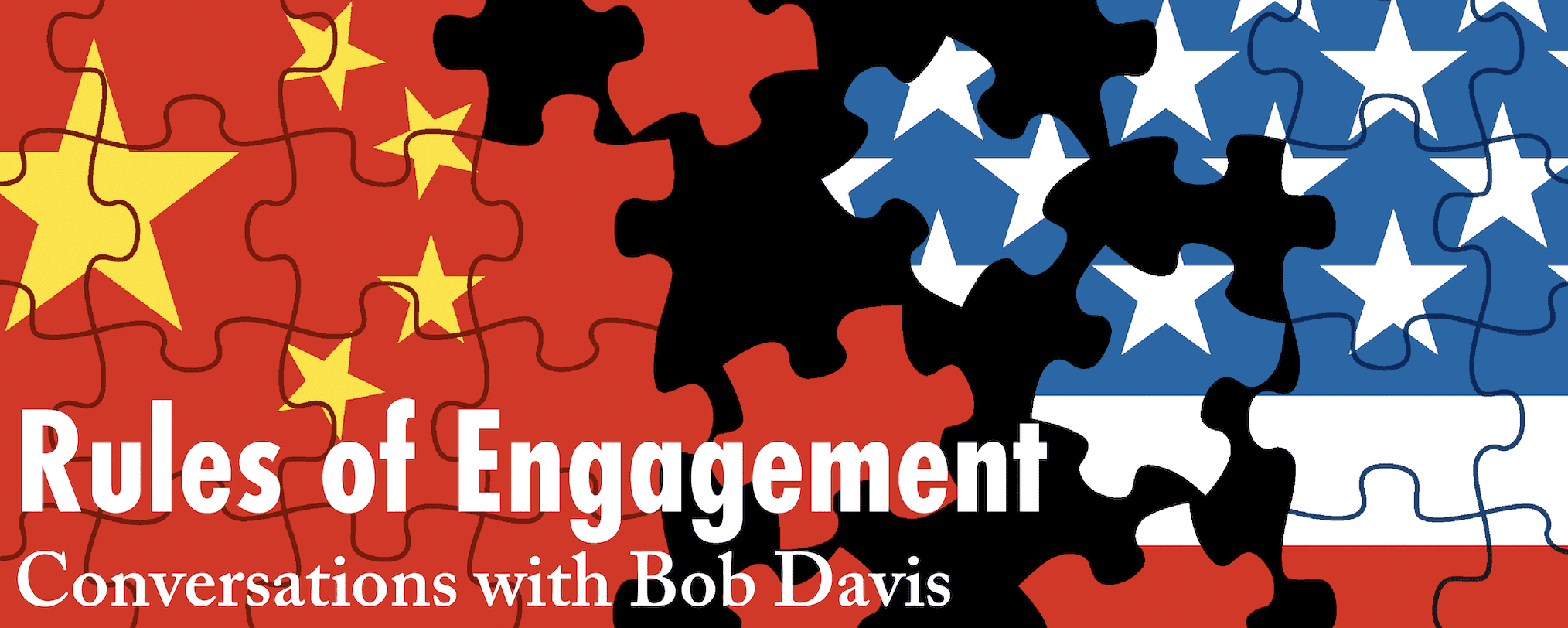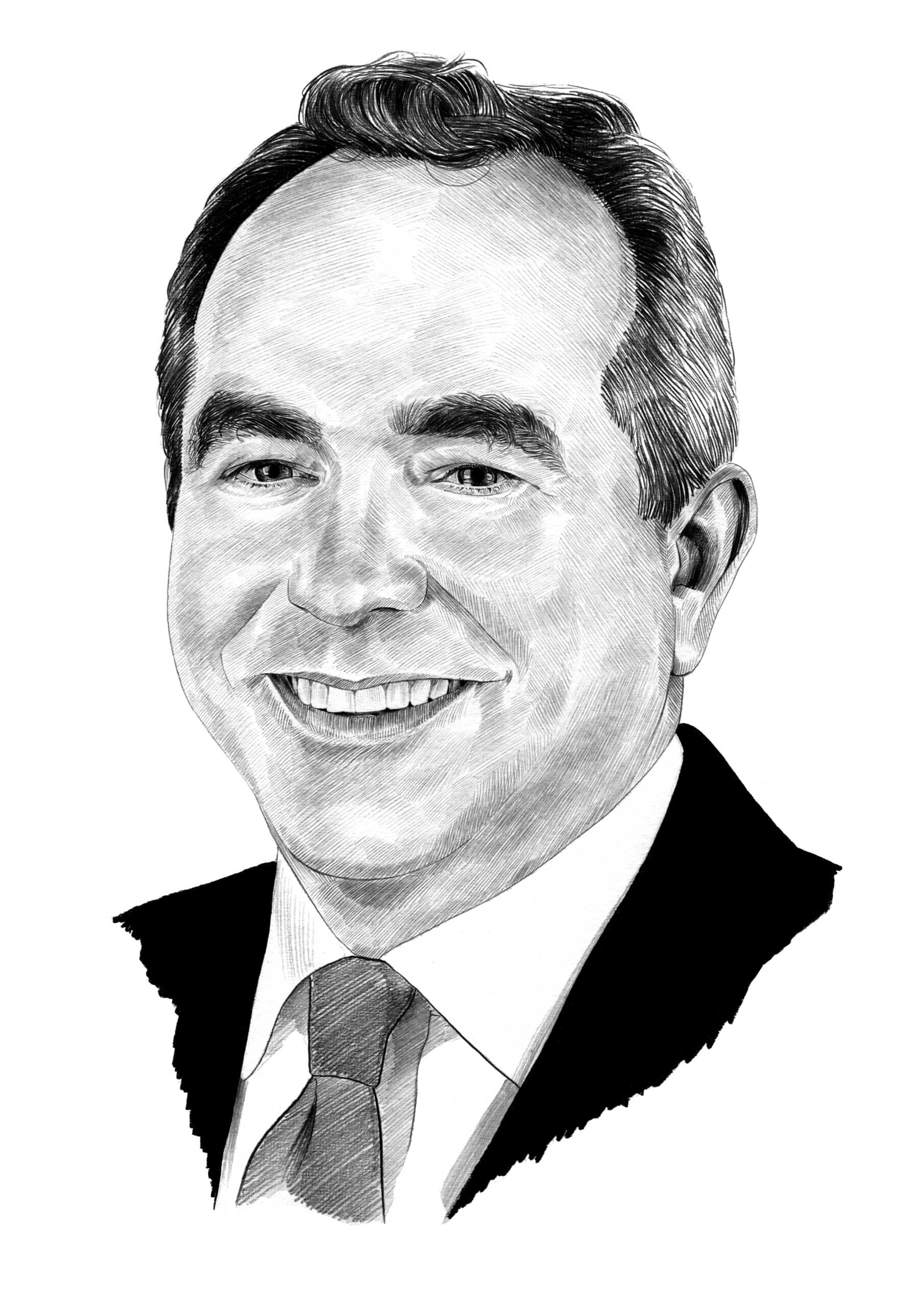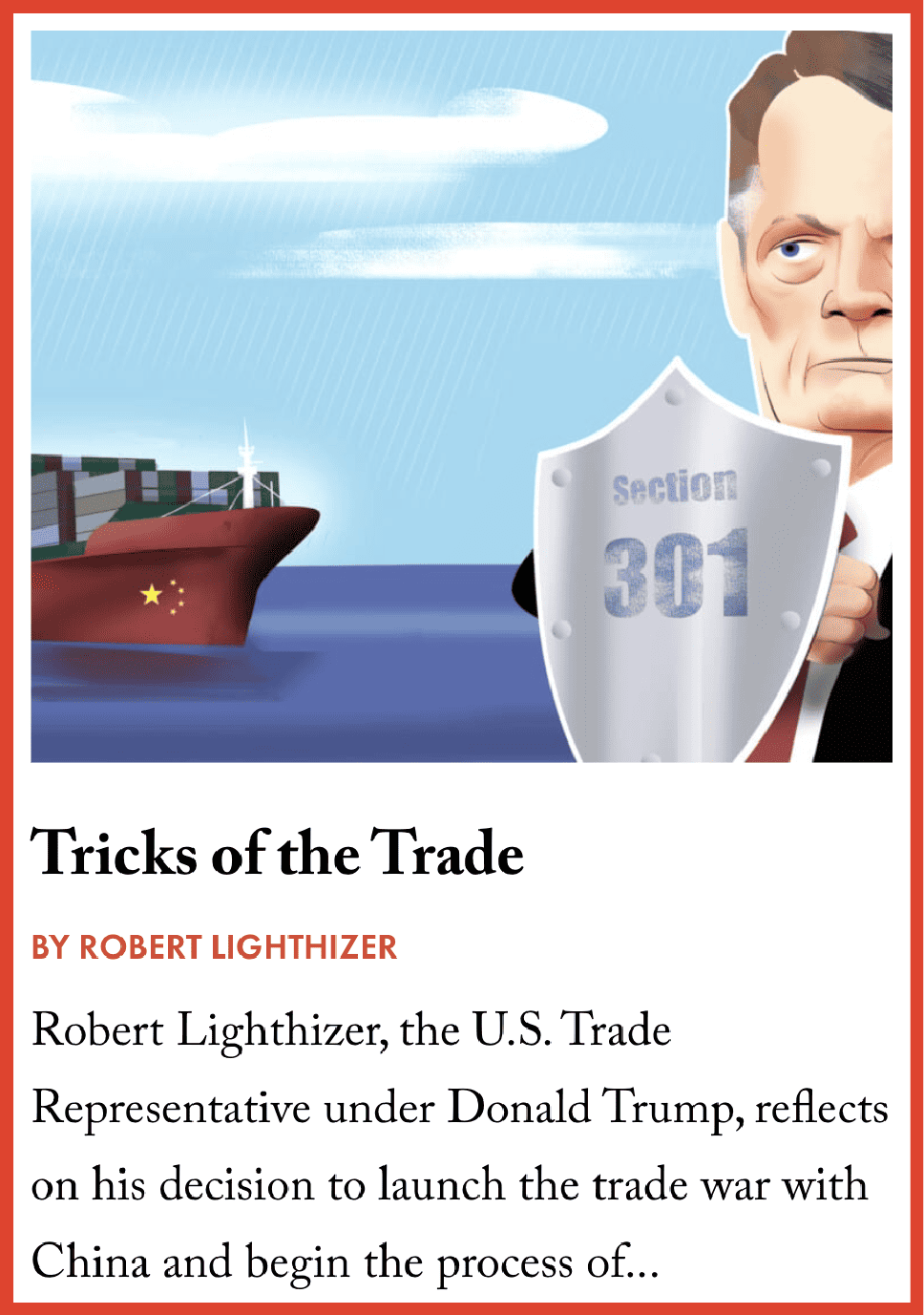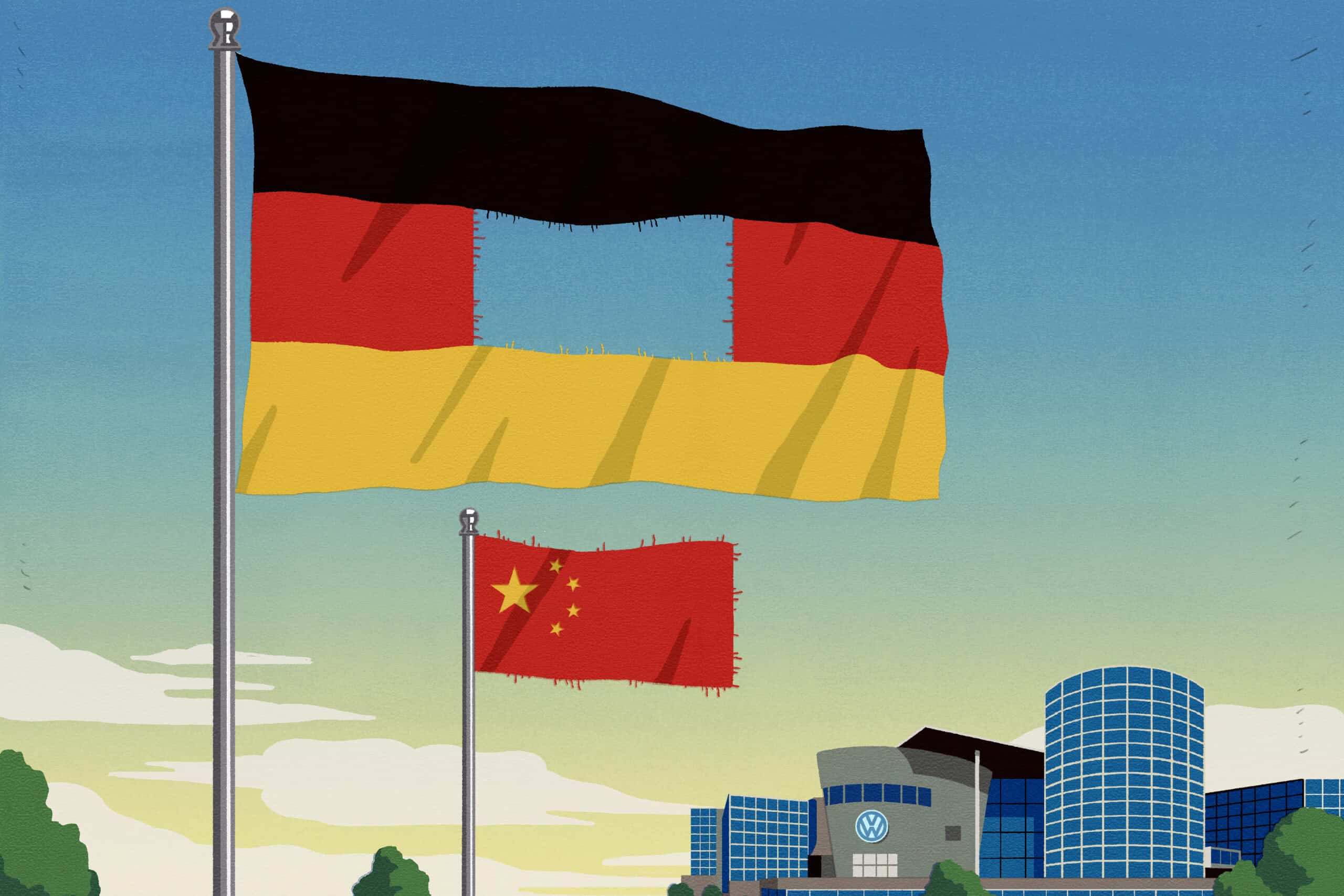Michael Froman played a major role in one of the biggest what-ifs in U.S.-China economic relations. As U.S. Trade Representative during the Obama administration, he negotiated the Trans-Pacific Partnership, a proposed trade deal of 12 countries in the Asia-Pacific region, which was at the heart of that administration’s China policy. TPP was designed to create a powerful bloc of nations who would trade tariff-free and agree to common standards governing state-owned enterprises, services and other 21st century economic issues. Initially, the deal would exclude China. But — in theory at least — China could enter if it agreed to TPP’s high standards. But TPP wasn’t concluded until late in the administration and Congress never voted on it. As president, Donald Trump pulled the U.S. out of the deal, while other nations ratified what is now called the Comprehensive and Progressive Agreement for Trans-Pacific Partnership. Prior to his USTR role, Froman was a senior international economic official in the Obama and Clinton administrations. After leaving the government, he became vice chairman of Mastercard. This summer he started as president of the Council on Foreign Relations. This interview is part of Rules of Engagement, a series by Bob Davis, who covered the U.S.-China relationship at The Wall Street Journal starting in the 1990s. In these interviews, Davis asks current and former U.S. officials and policymakers what went right, what went wrong and what comes next.

Illustration by Kate Copeland
Q: As a basic framework, this administration has divided the world into democracies and autocracies. What’s your view of that division as a broader way of dealing with China?
A: It’s certainly one lens through which to look at the relationship. With China being an autocracy, we can see what the implications are for how they’ve managed various issues, like the pandemic, and see the kind of mistakes autocracies make without having a feedback loop of an open press or a democratic process.
Of course, there are also limitations to that kind of framework, including that there are a number of countries that may not be fully democracies but who share with us a number of concerns about China, particularly on the economic side. Singapore is an awfully important country in the region. They were not invited to the Summit of Democracies in the first year of the Biden administration [Singapore also wasn’t invited to the 2023 summit]. But they certainly are a close partner of ours in thinking through regional economic issues as well as broader political and security issues.
When it comes to China, this administration hasn’t given economics the huge role past administrations have given it. How do you think the administration has looked at the role economics should play?
I’m not sure I fully agree with that. There’s been a convergence of economics and national security. In some respects, the U.S.-China relationship is being driven largely by economic issues, including concern about competitiveness, emerging technologies, and the use of export controls or investment screens.
But there are no trade discussions between the two countries, no joint review of the WTO or anything else [concerning trade]. The last administration had a trade deal with China: It was a vehicle that one could use for discussions.
What they called the Phase One deal during the Trump administration was really more of a purchase and sale agreement than what we call a trade agreement. There was more on what the Chinese would buy in terms of agriculture, energy, and other commodities of that sort. There was discussion of some of the other market access questions — on financial services, and other issues.
But you’re getting to an important point, which is I’m not sure we know what we want to ask China for — what our economic agenda is with them. Is it for them to reform their economy in certain ways to get back on the path of market liberalization? Would that make them a stronger and more efficient economy? Is that what we want? Would that make it easier for America and businesses to do business there? Is that being prioritized in this administration? We haven’t quite figured out what our wish list is for China on the economic side.
We know what we don’t want. We don’t want them controlling the supply of critical materials, critical minerals, or just critical products to us. We want diversification of supply chains. We don’t want them to beat us in the race for certain emerging technologies. But we haven’t yet redefined what our affirmative agenda is with China.
All the presidential National Security Strategies done since Reagan’s time, other than in the Trump administration, say that a prosperous China is in America’s interest. Is it still in America’s interest?
A China that continues to raise people out of poverty and plays by international economic rules and is willing to compete on a level playing field — that’s what presidents over the years were trying to convey by that [statement]. “We’re not trying to keep them down. We’re not trying to keep them poor.”
But as they achieve these objectives it’s really important that they do so without pursuing strategies that are very much directed at our expense by violating rules — such as developing dominance in a sector and then pricing it in such a way that it pushes everybody else out of the market. It’s those practices that we object to, not whether they should be prosperous.
Do you think the Chinese have a legitimate point when they say the U.S. is trying to contain them?
As we witness China become a more significant military power and exert itself more assertively, whether it’s in the South China Sea or around Taiwan or by building bases around the world, we need to look at things that could be dual use. That seems highly appropriate. If you suddenly have a new rival, there is no reason we should be enabling their capacity to compete with us in the security dimension.
When the Biden administration talks about a ‘high fence around a small yard,’ though, is it truly limited to dual-use technologies that could enhance their capacity to compete with us militarily in a strategic sense? Or does it cover technologies that could help them compete as an economy? For a lot of technologies, it’s difficult to draw that line. The administration will need to be rigorous on where to draw it, so that it’s not about preventing them from growing.

This summer, the current Chinese ambassador gave remarks at the Aspen Security Forum, where he said something along the lines of “it’s like being in the Olympics, and one team is wearing old-fashioned swimsuits and the U.S. team is wearing Speedos.”
I had a conversation with him afterwards to say that’s exactly right. In the Olympics one team does not have any obligation to give their best equipment to the other team. It is a race; that’s what competition is. We’ll do our best, you’ll do your best, and we’ll see where it goes. As long as there’s a level playing field, one side has no obligation to enable the other.
The way I’ve thought about it is that when they’re racing , the U.S. is putting a stick in the other guy’s leg and saying, “In the past you did this to us, so we’re going to do this to you.”
I think we’re trying to maintain a technological edge in this competition as opposed to transferring technology to China to help enable them to compete with us. I don’t think that’s a stick in their legs. That’s saying, you compete in your lane, we compete in our lane. It is different from what we’ve done before. It is different from the theory that it makes sense to sell the most advanced technology to another country, and we’ll do it on purely economic grounds.
| BIO AT A GLANCE | |
|---|---|
| AGE | 61 |
| BIRTHPLACE | San Rafael, CA, USA |
| CURRENT POSITION | President, Council on Foreign Relations |
Of course, the challenge has been that those decisions haven’t always been made on a purely commercial basis. There was effectively forced technology transfer. If you wanted to do business in China, oftentimes you had to take on a joint venture partner. As part of that joint venture agreement, you had to bring in technology and share it. Sometimes that joint venture partner went across the street and set up a factory using your technology and undercut you.
Next week at the APEC summit in San Francisco, Biden and Xi Jinping plan to meet. What do you expect from the meeting?
I don’t expect any major breakthroughs or agreements at the meeting. Rightly or wrongly, the meeting has become the deliverable, in and of itself. That is unfortunate because while meetings are important, we shouldn’t confuse them with progress or results.
A best-case scenario is they draw a line under the relationship saying, okay, it’s not going to sink any further than where it’s gone. There’s been efforts to do that through the visits of Antony Blinken, John Kerry and Gina Raimondo [with counterparts in China] and Jake Sullivan’s meetings with his counterparts around the world.
| MISCELLANEA | |
|---|---|
| FAVORITE BOOK | Stalin: Waiting for Hitler, 1929–1941 by Stephen Kotkin |
| FAVORITE FILM | Golda |
| FAVORITE MUSIC | Jazz |
| MOST ADMIRED | Ellen Johnson Sirleaf |
To do so at the head-of-state level would send a positive signal. You could see some process agreements around getting some people together around different issues, a little bit like what came out of Gina Raimondo’s visit on export controls.
The best case would be if there was some signal that China is buying into the framework that the Biden administration has laid out involving cooperation on things like climate, issues of potential conflict that need to be managed carefully, like the South China Sea and Taiwan, and issues of competition.
You spent an enormous amount of time under President Obama trying to finish the Trans-Pacific Partnership deal. By the time you had a deal, it was very late in the administration. Do you think to yourself, I wish I would have done this or that differently?
Oh, sure. There were a number of reasons why it was delayed, some of which were largely imposed on us by external forces and some of which we probably could have done better ourselves. The deal got completed and considered too close to a presidential election, which is always difficult in terms of trade being a political issue.
But we were also seeing a decline, particularly among Republicans, of support for free trade. If you look at all the polls, there is declining support among Republicans, but actually increasing support among mainstream Democrats, although that’s not necessarily reflected in leadership of either party.

Trade agreements historically need a very significant portion of the Republican party and a decent number of Democrats [for passage]. Having said all that, the TPP ended up going into effect, [renamed CPTPP or Comprehensive and Progressive Agreement for Trans-Pacific Partnership] among the other 11 countries.
The U.K. has now joined. Other countries are seeking to join. And USMCA, which is a very good and sound agreement, draws heavily from TPP. [The renegotiated NAFTA, now called the U.S.-Mexico-Canada Agreement, was negotiated under the Trump administration, and passed Congress with large majorities]. Some have estimated that 85 percent or so of the USMCA text is TPP. The additional changes that the Trump administration made in various areas, including enforcement of labor, and the dropping of some controversial provisions that Republicans used to insist on, like protection of investments and commercial property, made it possible to get that through under the Trump administration and a Republican Congress.

Should the U.S. join the CPTPP?
Unfortunately, I don’t think it’s a relevant question. There’s enough political baggage around it that I don’t think rejoining is possible.
The IPEF — the Indo-Pacific Economic Framework [a trade arrangement being negotiated by the Biden administration] — is useful. A significant value of TPP was simply getting those countries together in a room and creating habits of cooperation. IPEF has the potential to do the same.
Oftentimes, people get very focused on whether there is market access or tariff agreements. Some of those concerns are largely overemphasized. In TPP, half the countries already had free-trade agreements with us. They were not getting any additional market access. And yet they were still willing to talk about raising labor and environmental standards and dealing with a whole variety of other issues because they wanted the U.S. engaged. That same dynamic potentially exists with IPEF.
A lot of focus is on tariffs and goods, but the economy is largely now services, and increasingly digital services. So, setting standards and rules, in my view, is oftentimes more impactful than talking about tariffs. Tariffs are already low. IPEF has the potential to engage on questions of the economy of the future.
I think [China is] interested in joining to ensure that they can prevent anybody else from joining. And conceivably so that they can water down or undermine the potential strength of the [CPTPP].
What we have to offer that nobody else has to offer is our research and development, our risk capital capabilities, our entrepreneurship, our innovation. And what we haven’t done as well as perhaps we could is figure out how to use that as an asset in conversations with other countries.
If a country knew that they could come and participate in a meaningful R&D project around an emerging technology in the U.S. because they were part of IPEF, that would have infinitely greater value to them than reducing a tariff from 3 percent to zero on a product.
What’s the significance of China trying to join CPTPP?
Given the direction of China’s economic policy over the last decade, it’s very hard for me to see how they could meet [CPTPP’s] high standards. I think they’re interested in joining to ensure that they can prevent anybody else from joining. And conceivably so that they can water down or undermine the potential strength of the arrangement.
One of your former negotiators, Wendy Cutler, along with Clete Willems [a Trump White House trade official], have been talking about ways to expand USMCA by inviting other countries to join.

It has potential. It’s a clever approach because on one hand the substance [of USMCA] is quite similar to TPP. So, you’re getting the high standards of TPP in the context of some important additional steps that Ambassador [Robert] Lighthizer pursued that was able to attract a broader bipartisan support.
I’ve talked to U.K. colleagues and said, why not just join USMCA? I think others would be interested in joining. I think selectively you could go to the Asia-Pacific region and add other countries that would otherwise be part of CPTPP or IPEF. If they’re ready to live up to the high standards, they could join this as well.
Do you think Mexico would go along? They now have privileged access to the U.S. through tariff-free trade.
I think they would go along. A lot of the dynamic in CPTPP was that Mexico already had full access to the United States, but this allowed them to get access to Japan.
Former USTR Robert Lighthizer today makes the point that the 25 percent tariffs the Trump administration assessed on electric vehicles have protected the U.S. auto industry compared to the European auto industry, which is dealing with a big import surge from China. Has your view of the value of tariffs changed in some fashion?
Then United States Trade Representative Michael Froman testifying before the Senate Finance Committee on President Obama’s 2014 trade policy agenda, May 1, 2014. Credit: C-SPAN
One should look at the pool of products on which tariffs were imposed and disaggregate between the ones that are strategically significant and the ones that are more of a commodity. As a former trade negotiator, I’m all in favor of creating leverage. But it goes back to your earlier question, creating leverage for what purpose?
The costs of tariffs are mostly borne by the people who can least afford it. It’s the people at the lower end of the economic scale who tend to spend a disproportionate amount of their disposable income on the kinds of things that are imported from China, whether that’s clothing or toys or other things of that sort.
In terms of electric vehicles, we have an interest in having a robust electric vehicle manufacturing capacity here. We have differential tariffs on trucks versus cars. [The U.S. assesses a 2.5 percent tariff on imported cars and a 25 percent tariff on trucks.] And as a result, we have a pretty robust truck industry here. So, I imagine [the Trump administration] looked at that and said, okay, we want to do the same thing for electric vehicles that we did for pickup trucks.

Now, those tariffs were put in place long before the IRA. [The Inflation Reduction Act provides tax credits for purchases of electric vehicles.] So, now we have another way of looking at how we incentivize production here including subsidies. One needs to look at the tariffs in the context of what are the other elements of industrial policy that we’ve begun to pursue? Is it still necessary to have a tariff to incentivize production here? It’s not obvious to me that it is.
It sounds like you would eliminate some of the China tariffs, and maybe even stiffen some on products that we want made here.
I would certainly look at whether there are products where the tariff could be eliminated. Politicians and policymakers need to make more explicit about the trade-offs that are involved in these issues. We don’t like our dependence on China, and we don’t like inflation. We deal with our dependence on China by imposing a higher cost on consumers [through tariffs], raising their cost of living, but inflation and affordability are serious issues in the eyes of most American consumers.
Ambassador Lighthizer did try and take leverage out for a drive [by assessing tariffs on three-quarters of everything China sells to the U.S.] to get the Phase One Agreement. The challenge is, once you put tariffs on, everyone gets used to them and they’re hard to take off. They’re a very blunt tool.
And the proposal now to put across-the-board tariffs on everything — I don’t fully understand what the rationale is for that. [Lighthizer has proposed putting high tariffs on all Chinese imports until the trade deficit with China is eliminated.]
If Biden wins a second term, do you think that we’ll see a more aggressive trade policy, one that might include deals that require Congressional approval?
There’s potential for that. I’m not holding my breath for rejoining TPP or anything of that sort. But now there’s discussion about a U.S.-U.K. deal. There’s been ongoing conversations with Kenya around some sort of economic partnership.
This administration is experimenting with achieving some of the same objectives that trade policy was intended to achieve — integrating with other countries, building closer economic relationships, incentivizing supply chains, etcetera, that don’t look like traditional trade agreements.
What’s your concern in this area if Trump were to win a second term?
The Biden administration has done a very good job of re-engaging with our allies and partners, whether that’s NATO around Ukraine or whether it’s the IPEF countries. I would worry if an administration came in and again became more isolationist and pulled back from that kind of engagement. The rest of the world wants our engagement. The more China asserts itself in various fora, various regions, the more others want the U.S. there as a counterbalance. There’s such a strong inclination among some to just look inward, to pull back.

Let’s switch to Mastercard. As I understand it, China agreed to open its market to credit and debit cards in 2006. The U.S. won a WTO case on the issue in 2012. China agreed to comply in 2013, but didn’t even allow an application until 2017, and you didn’t get full access to Alipay and WeChat until 2023. I’m told Mastercard still doesn’t have a license to operate there. How did you try to change that?
I’m not going to comment too much on Mastercard, only to say that it still has a license application in. It’s been working with the People’s Bank of China and the other authorities there. It’s got a proposed joint venture partner to work with, and it hopes to ultimately be able to provide services in the domestic market, as China has agreed to.
It was agreed in their WTO accession [back in 2001]. And it was part of the Phase One Agreement that the Trump administration announced. It was specifically mentioned as one of the areas that China committed to. So, not yet fully delivered.

What’s the lesson for companies trying to deal in China?
It is probably easier for companies to gain market access in China in areas where China does not view that product as strategic in nature. And by strategic, I don’t necessarily mean having anything to do with military or national security, although it certainly applies to that. Where they designate that they need to be present and dominant in a particular sector or technology, it’s very hard for others to penetrate.
But if you can’t even count on their word when they make an agreement, it seems pretty tough, to say the least, to do business there.
This is one of the reasons why support from the business community for the U.S.-China relationship deteriorated over time. The China market remains a very attractive opportunity. But these obstacles that have been put in place in a lot of different sectors have made it more and more difficult for foreign companies to pursue their business there.
When you talk to CEOs, do you see a wariness about traveling to China, because they’re afraid that they may not be able to get out of China?

I have heard that from some. For a while it was because of various Covid protocols. People were worried that if they tested positive, they might not be able to leave the city they were in, or the country, for some extended period of time. And in recent months, when we’ve seen the Chinese crackdown on executives from foreign firms who were either in the consulting business or in various parts of the information business, I hear from CEOs a reluctance or at least a pause about going.
On the other hand, now that Covid has become more manageable there, starting back in the spring you have begun to see CEOs return, whether it was for the China Development Forum or the Bo’ao Forum, or on their own. It’s become a little bit more normal.
Have you been there [recently]?
I’ve not been there since 2019. In my current job I don’t really have a need to go.
Let’s go way back to when you were an aide to Treasury Secretary Robert Rubin and you were trying to sell the WTO agreement with China to Congress. Do you think you overdid it?
A couple of responses. There were some who made the argument that this is going to lead not just to further economic liberalization, but to political pluralism and democracy in China. That was overstated.
I think we recognize the limits of our influence, but what we don’t know is whether we would’ve had any influence whatsoever if [China] had remained on the outside.
But the fundamentals of globalization were happening with or without China’s formal entry into the WTO. It had much more to do with containerization of shipping than it did on any trade agreement. China was already getting annually the benefits of access to the U.S. market. [Prior to the WTO deal, Congress annually voted to assess low tariff rates on Chinese goods.]
What do you say to people who say the U.S. was played for a sucker?
It’s always hard to argue the counterfactual. What would China be like if we didn’t let them in? Do we think we could have had more influence on their behavior if they weren’t part of these institutions? I think we recognize the limits of our influence, but what we don’t know is whether we would’ve had any influence whatsoever if they had remained on the outside.

Bob Davis, a former correspondent at The Wall Street Journal, covered U.S.-China relations beginning in the 1990s. He co-authored “Superpower Showdown,” with Lingling Wei, which chronicles the two nations’ economic and trade rivalry. He can be reached via bobdavisreports.com.



















